
Local HVAC Repair: Your Go-To Guide for Keeping Cool (or Warm!)
November 11, 2025
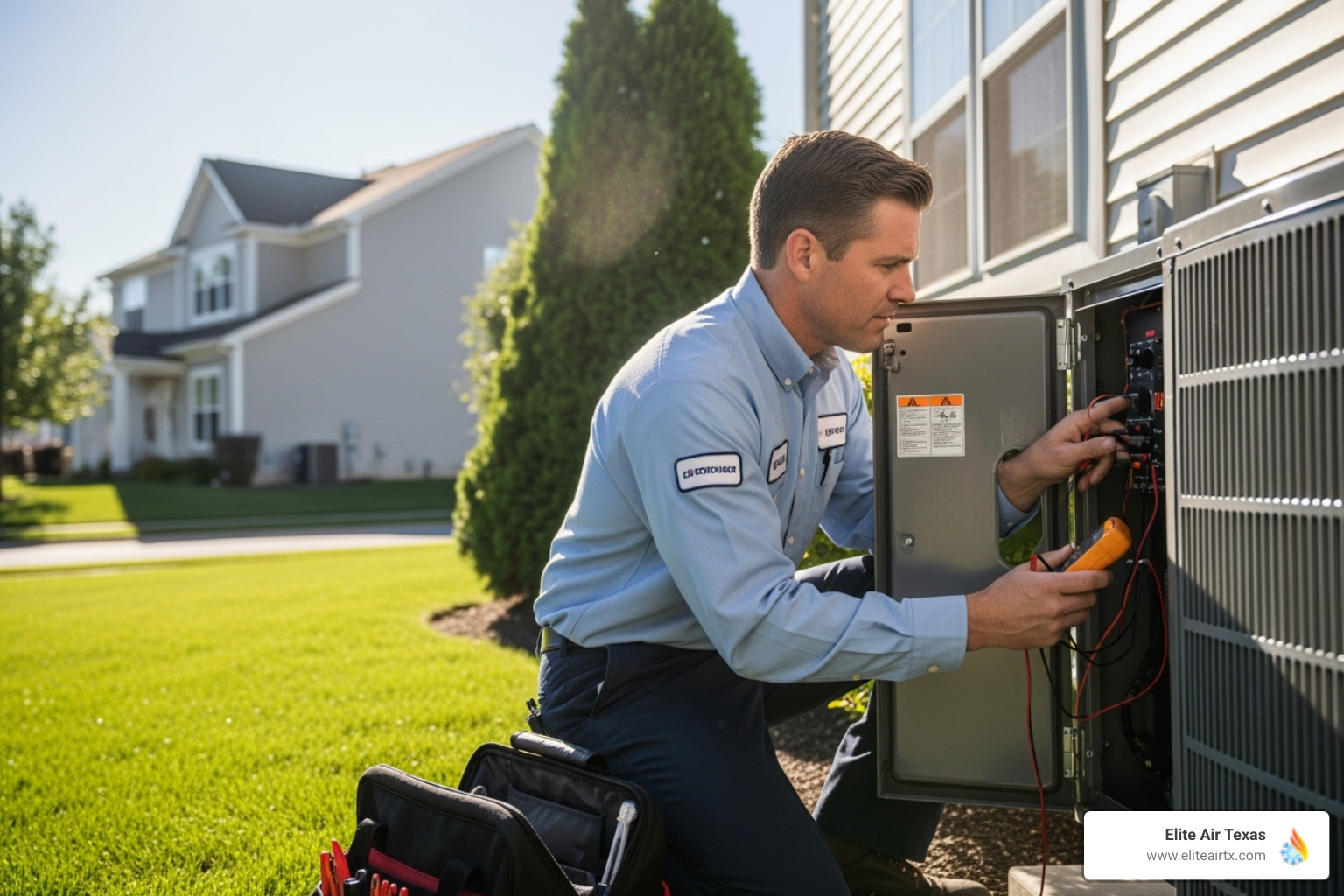
Why Local HVAC Repair Matters for Texas Homeowners
When your local hvac repair needs arise, a quick response can mean the difference between a minor inconvenience and days of discomfort. In the blazing Texas heat or on a surprisingly chilly winter night, a broken HVAC system is more than just an annoyance—it's an emergency.
Systems often fail at the worst possible times, but most problems start small. A strange noise or slightly higher energy bills can be early warnings. This guide will help you spot those signs, perform simple troubleshooting, and know when to call a professional.
Quick Local HVAC Repair Checklist:
- Check thermostat settings: Ensure it's set to cool/heat with fresh batteries.
- Replace air filter: A dirty filter is a leading cause of HVAC problems.
- Reset circuit breaker: Check your electrical panel for tripped breakers.
- Clear outdoor unit: Remove leaves, grass, and debris from around the condenser.
- Call professionals for: Electrical issues, refrigerant leaks, or major component failures.
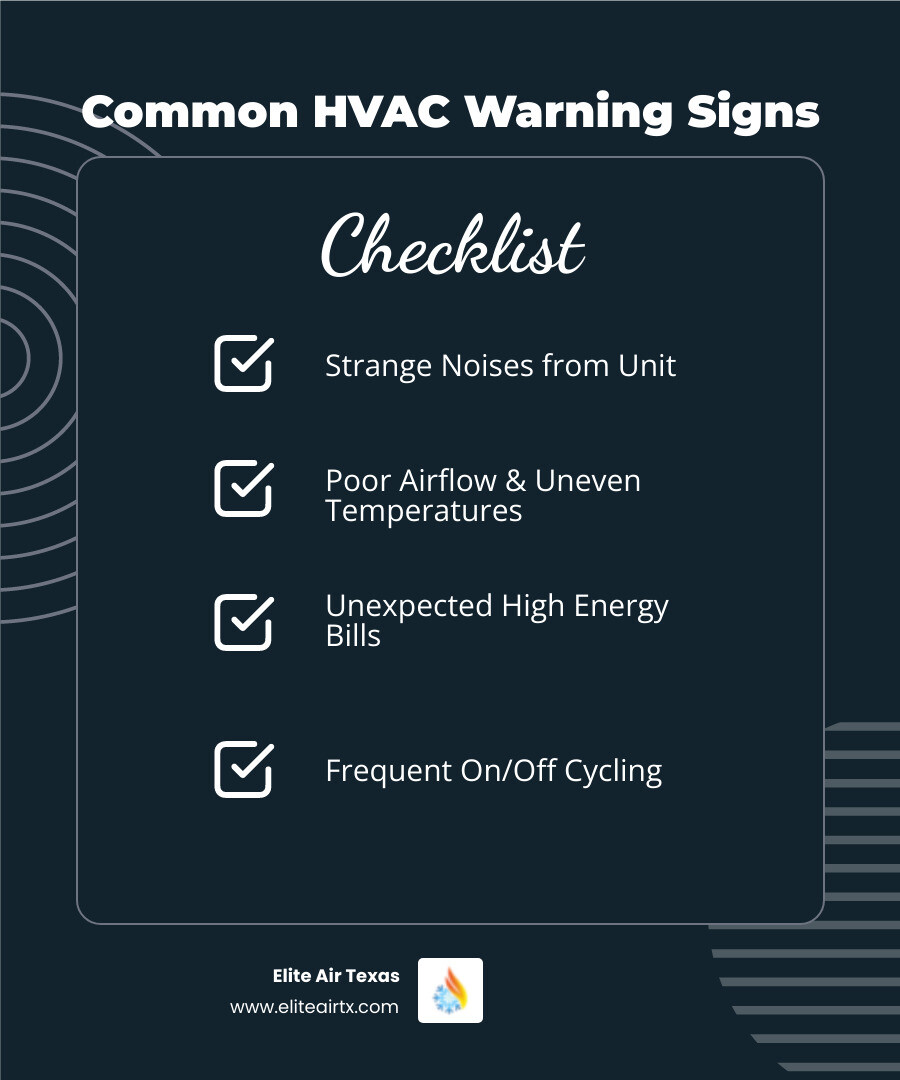
Basic local hvac repair terms:
Is Your HVAC System Crying for Help? Common Warning Signs
Your HVAC system usually gives warning signs before a complete breakdown. Learning to recognize these signals can save you from emergency local hvac repair calls and expensive disasters.
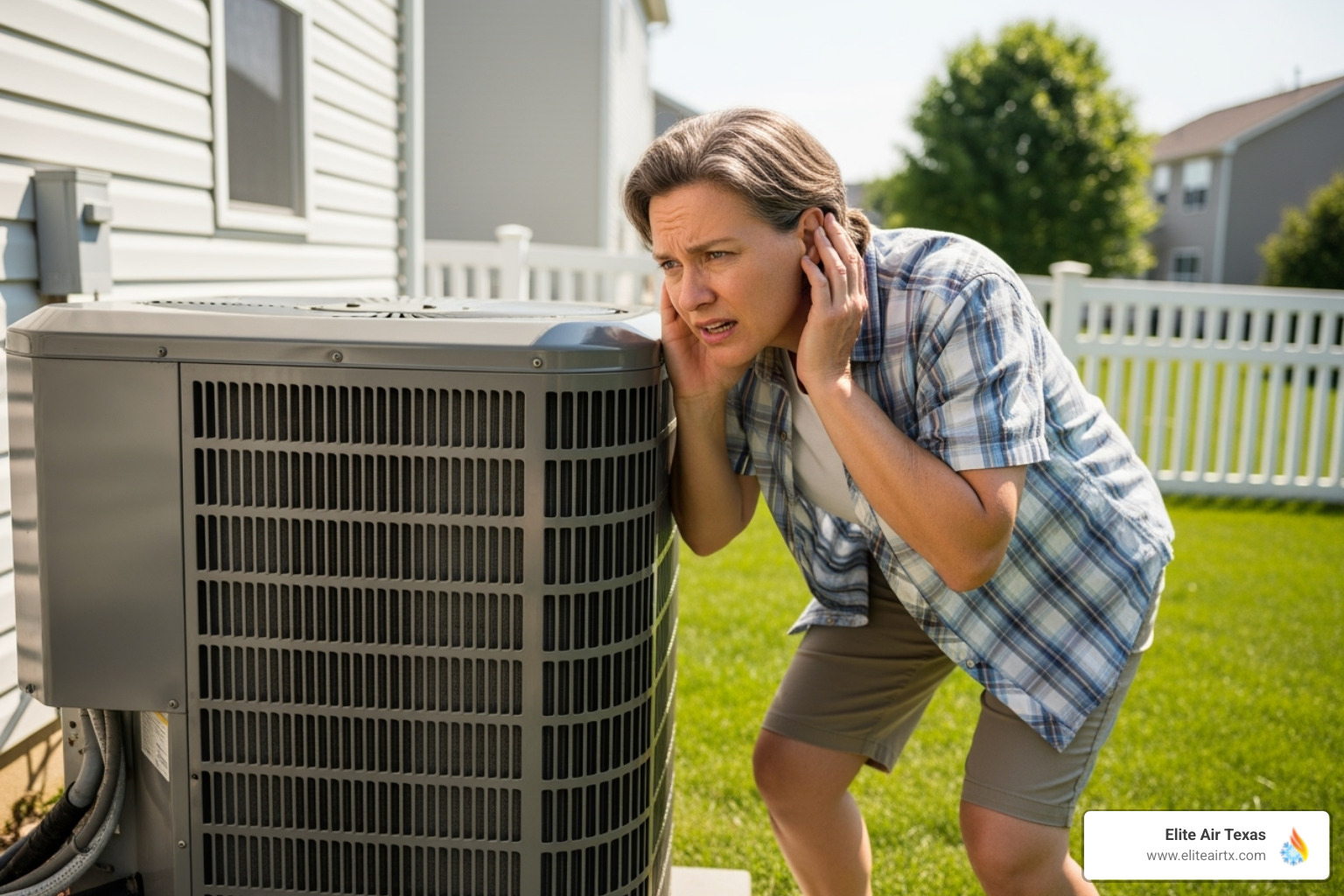
For Your Air Conditioner
When Texas temperatures soar, watch for these cooling system issues:
- Weak Airflow: If the air from your vents feels like a gentle breeze instead of a strong flow, it could be a dirty filter or a more serious issue with your ductwork or blower fan. Our guide on AC Airflow Problems can help.
- AC Won't Cool: If your system runs constantly but never reaches the set temperature, it may point to refrigerant issues or compressor problems. When your AC Not Cooling, it's time to investigate.
- Water Leaks: Puddles around your indoor unit are a red flag for a clogged drain line or frozen coils, which can cause water damage. Learn more by Troubleshooting AC Water Leaks.
- Strange Noises: Grinding, squealing, or banging sounds indicate that mechanical parts are failing. These noises rarely fix themselves. For grinding sounds, see our guide on Why AC is Making Grinding Noises.
- Unpleasant Odors: A musty smell may suggest mold, while a burning odor can signal electrical trouble. A rotten egg smell requires immediate attention for safety. Learn what to do if your AC Smells Like Rotten Eggs.
- High Humidity: If your home feels sticky even when the AC is on, your system may be oversized or low on refrigerant, preventing it from properly dehumidifying the air.
For Your Heating System
When cooler weather arrives, look for these heating system warning signs:
- Uneven Temperatures: If some rooms are toasty while others are cold, your system isn't distributing heat properly due to ductwork, thermostat, or furnace issues.
- Cold Air from Vents: If your system blows room-temperature or cold air, you may have a problem with the heating element, gas supply, or ignition system.
- Frequent Cycling: A heater that turns on and off in short bursts is "short cycling," which wastes energy and puts excessive wear on components. This often signals an underlying problem, similar to when an AC System is Short Cycling. For local service, we offer expert Heating Repair Arlington, TX.
For Your Heat Pump
Heat pumps work year-round and can have unique problems:
- Declining Efficiency: If your heat pump runs constantly but struggles to maintain temperature, or your energy bills are rising, its efficiency may be dropping.
- Stuck in One Mode: If the unit won't switch between heating and cooling, the reversing valve or control system likely needs attention.
- Excessive Ice Buildup: Thick ice on the outdoor coils that doesn't clear during a defrost cycle points to issues with refrigerant levels, airflow, or the defrost system. For reliable local hvac repair, our team provides professional Heat Pump Repair services.
Basic HVAC Troubleshooting for Homeowners
Before calling for local hvac repair, a few simple checks can sometimes solve the problem and save you a service call.
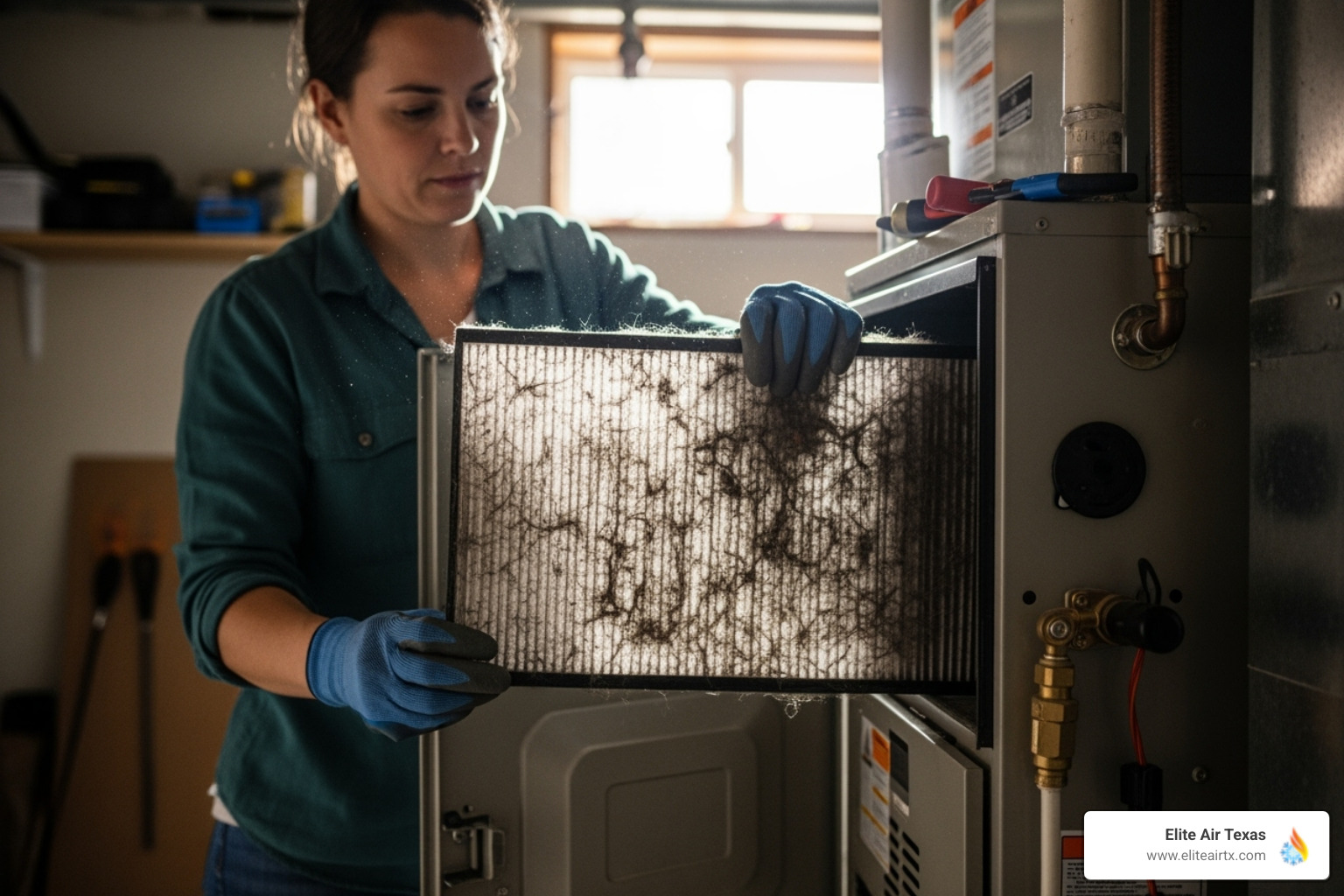
Quick Checks Before You Call
Try these steps first—you might be surprised how often they work!
- Check your thermostat. Ensure it's set to "cool" or "heat" and that the temperature is correct. Weak or dead batteries in digital thermostats can cause mysterious issues. Our AC Thermostat Troubleshooting Guide offers more tips.
- Inspect your air filter. A dirty air filter restricts airflow and is responsible for a majority of HVAC problems. If you can't see light through it, it's time for a replacement.
- Look at the circuit breaker. Your HVAC system has dedicated breakers. If one has tripped, flip it completely off, then back on. Warning: If it trips again immediately, stop and call a professional. This indicates a serious electrical problem. Learn more about Why AC Circuit Breaker Keeps Tripping.
- Find the outdoor unit power switch. This switch, usually in a box mounted on the house near the unit, can sometimes be accidentally turned off.
- Clear your vents. Make sure all vents are open and not blocked by furniture or rugs. Your system needs clear pathways to circulate air effectively.
When to Call for Local HVAC Repair
Some problems are best left to the professionals. Knowing when to call can prevent a small issue from becoming a large, expensive one.
- If basic troubleshooting doesn't work, it's time to call in an expert.
- Electrical issues like a repeatedly tripping breaker, burning smells, or sparks require immediate professional attention. Turn off the system and call for help.
- A suspected refrigerant leak (hissing sounds, ice on coils in summer) is not a DIY fix. Refrigerant requires certified handling. Our guide on AC Refrigerant Leaks explains more.
- Major component failures, such as a loud bang from your unit or a compressor that won't start, need an expert diagnosis. Learn the Warning Signs AC Compressor is Failing.
- When in doubt, trust your gut. If something seems unsafe, it's always better to call for a professional inspection.
How to Choose the Right Local HVAC Repair Contractor
Finding a trustworthy local hvac repair contractor is essential for your home's well-being, especially in Texas communities like Aledo, Arlington, and Fort Worth, where extreme weather is the norm.
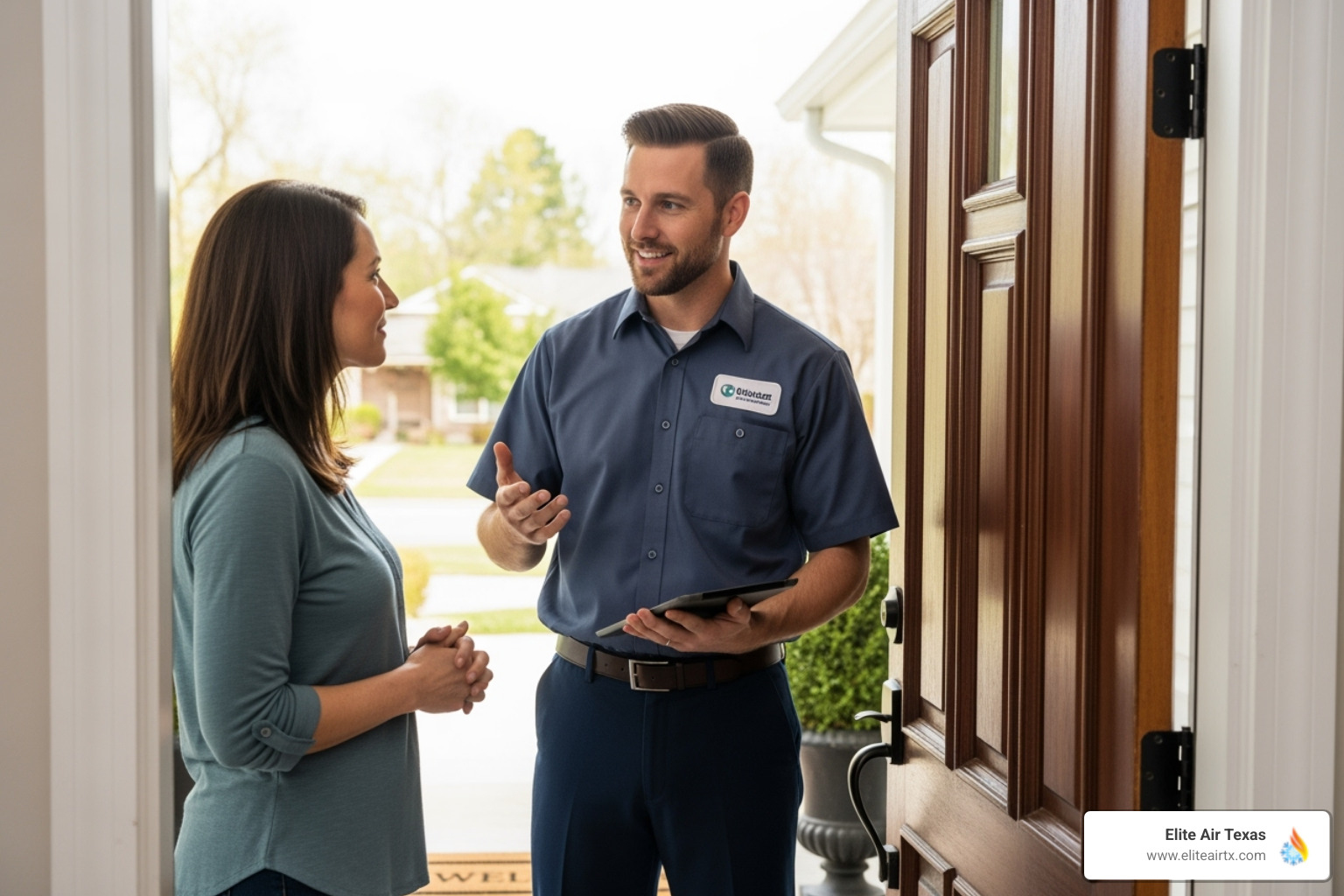
The Advantages of Hiring a Local Pro
Choosing a local company offers significant benefits. Faster response times are critical when your AC fails on a 105-degree day. Local contractors also have a community reputation to uphold, as we live and work alongside our customers. We bring familiarity with local climate challenges and building codes, and we can provide the personalized service that larger chains often lack.
What to Look For in a Contractor
- Licensing and Insurance: This is non-negotiable. It protects you and ensures the work meets professional standards.
- Positive Customer Reviews: See what your neighbors are saying. Look for consistent praise for reliability and quality work. You can read all our reviews to see our track record.
- Technician Qualifications: Experienced, well-trained technicians diagnose problems correctly the first time.
- Strong Warranties: A company that stands behind its work with solid warranties on parts and labor, like our 10-year labor warranty, shows confidence in its service.
- After-Service Support: The best contractors offer ongoing support and maintenance plans.
Questions to Ask Your Local HVAC Repair Company
Before hiring, ask these key questions to vet your contractor:
- Can you provide proof of your licenses and insurance?
- What is your experience with my specific system brand?
- What kind of warranty do you offer on parts and labor?
- Do you offer emergency service outside of regular hours?
- Do you have preventative maintenance plans?
The Better Business Bureau also offers great advice on what to ask a heating and air conditioning company before hiring a technician.
Preparing for the Service Visit
To make your local hvac repair visit as efficient as possible, have the make, model, and approximate age of your unit ready. Write down the symptoms you've noticed and any recent repair history. Finally, ensure there is clear access to both your indoor and outdoor units.
Beyond Repairs: HVAC Maintenance, Lifespan, and Replacement
While immediate local hvac repair is crucial, a long-term strategy for your system's health can save you money and prevent future breakdowns. Professional HVAC companies offer a range of services to support your home's comfort. Our HVAC Services include:
- Diagnostics and Repair: Finding the root cause of a problem and fixing it right. We offer expert HVAC Repair Dallas, TX and service in surrounding communities.
- Preventative Maintenance: Regular tune-ups to prevent issues before they start. Our HVAC Maintenance programs are designed to improve efficiency and extend system life.
- System Installation: When it's time for an upgrade, we help you choose and install the perfect system for your home. Our HVAC Installation services are customized to your needs.
Extending Your HVAC's Lifespan
Consistent care is the secret to a long-lasting HVAC system. Regular professional maintenance is essential. An annual AC Maintenance visit keeps your cooling system running smoothly. You can also help by keeping your outdoor unit clear of debris and ensuring indoor vents are not blocked by furniture.
Repair vs. Replace: Making the Call
Deciding whether to repair or replace an aging system can be tough. Consider these factors:
- Age: Most AC units last 15-20 years, while furnaces can last 15-30 years. If your system is approaching the end of its typical lifespan, replacement often makes more financial sense. See the Signs AC Unit Needs Replacement.
- Repair Frequency: If you're calling for local hvac repair service more than once a year or facing a major component failure, the cost of repairs can quickly add up.
- Energy Efficiency: If your energy bills are climbing, a modern, high-efficiency system can offer significant savings over time.
The Professional Installation Advantage
When you invest in a new system, professional installation is critical. It ensures your system runs efficiently, extends its lifespan, and protects your warranty. Poor installation can void warranties and create safety hazards. Learn about AC Installation Risks and Consequences.
Professionals perform detailed calculations to ensure your system is properly sized for your home. They also ensure all work meets local building codes and manufacturer requirements. For an overview, see our AC Installation Dallas Complete Guide.
Handling HVAC Emergencies
An HVAC emergency is a complete system failure during extreme weather—no heat during a freeze or no cooling in a Texas summer. These situations require immediate attention. Our team offers 24/7 availability to handle these urgent calls. Our AC Emergency Response guide explains what qualifies as an emergency.
Frequently Asked Questions about HVAC Care
We've answered thousands of questions about local hvac repair and system care. Here are a few of the most common ones.
How often should I have my HVAC system serviced for optimal performance?
We recommend annual maintenance for most systems to catch small issues before they become expensive emergencies. For a heat pump that handles both heating and cooling, we suggest twice-a-year service: once in the spring and once in the fall. Regular tune-ups improve efficiency, lower energy bills, and extend your system's lifespan. Our Preventative Maintenance Agreements make scheduling easy.
What should I look for in an HVAC contractor's warranty?
A good warranty shows a contractor stands behind their work. Look for two main types:
- Parts Warranty: This comes from the manufacturer and typically covers components for 5-10 years.
- Labor Warranty: This is offered by the contractor and covers the installation or repair work itself. We are proud to offer a 10-year labor warranty on our installations, demonstrating our confidence in our team's craftsmanship.
Always get warranty details in writing to understand what's covered and for how long.
What are the best times of year to replace an HVAC system?
While we can replace a system any time, the "shoulder seasons" of spring and fall are often ideal. During these milder months, demand is lower, which can mean more flexible scheduling and potential off-season promotions. This allows you to make a thoughtful decision without the pressure of an emergency breakdown during a heatwave. However, if your current system is failing and costing you money, it's best to replace it as soon as is practical, regardless of the season.
Your Partner for Reliable Home Comfort
Your home should be a sanctuary from the Texas weather. This guide has provided the essential knowledge for every homeowner, from identifying warning signs and performing basic troubleshooting to choosing the right contractor and knowing when to repair or replace your system. Proactive maintenance is your best defense against unexpected breakdowns, helping your system run efficiently and last longer.
At Elite Air of Texas, we understand that your home's comfort is personal. We're not just a service company; we're your neighbors, serving families throughout Aledo, Arlington, Dallas, Fort Worth, and the surrounding communities. Our commitment is to be your long-term partner in maintaining a comfortable and healthy home.
Our promise to you includes affordable comfort, elite service, significant discounts as a Platinum Vendor, free second opinions, and a comprehensive 10-year labor warranty that demonstrates our confidence in our work.
Whether you need routine maintenance, emergency repairs, or guidance on a new system, we're here when you need us most. When you need fast and reliable service, contact us for Emergency AC Repair in Dallas, TX or any of our service areas. Your comfort is our priority.
Ready to Enhance Your Comfort?
Contact our experts today to discover tailored HVAC solutions that fit your needs perfectly.


%201.svg)

